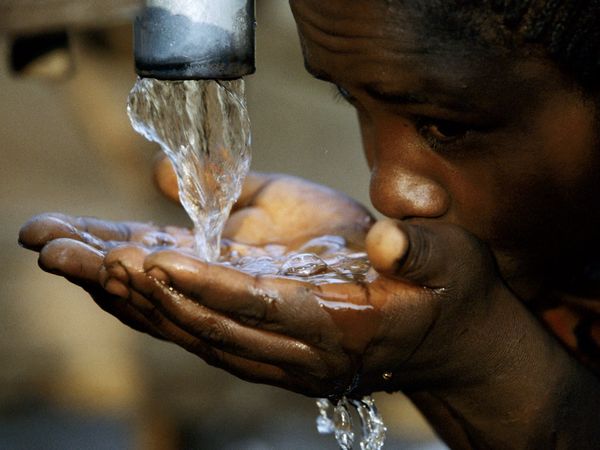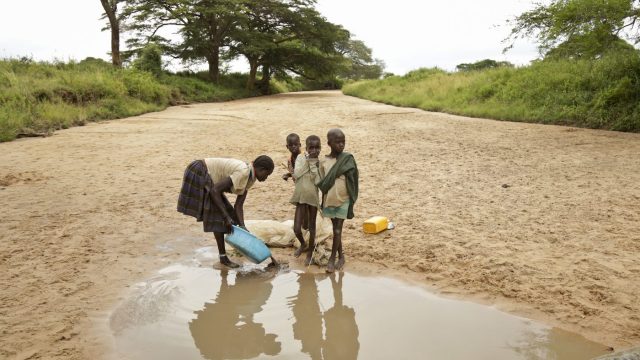Dear Beamers,
Greetings! In line with our continuous dedication to providing comprehensive insights and updates, we are delighted to present the latest edition of our newsletter. This edition delves into the enduring challenge of water scarcity, an age-old issue that remains a prominent threat to sustainability in the 21st century.
The provision of clean water and sanitation is an inherent human entitlement. However, it poses a formidable obstacle for millions in Nigeria, who have never experienced access to secure sanitation facilities throughout their lives. The persistent absence of safely managed drinking water services prompts reflection on whether societal progress aligns with the contemporary era or if we are stagnating in an antiquated paradigm as time progresses.
“Water is becoming a big problem around the world. Even in places that usually have enough water, things like broken pipes, pollution, fights over water, and not managing water well are making it hard for kids to have clean water and proper sanitation. This not only makes it difficult to get safe drinking water but also makes it tough to practice good hygiene at home, school, and healthcare places. When water is scarce, the systems that deal with sewage can stop working, leading to diseases like cholera. And when there’s not enough water, it becomes more expensive.” Says Jolayemi , CEO Aquapureza
A significant number of Nigerians lack access to essential drinking water services, forcing numerous communities to rely on unsafe water sources such as streams or ponds. Unfortunately, these water bodies are often contaminated due to open defecation, urination, and the improper disposal of waste by individuals. Moreover, untreated wastewater, containing hazardous substances from sinks, drains, and gutters, is discharged back into streams and other points, exacerbating the environmental and public health challenges.
The water scarcity crisis has profound repercussions on individuals’ health, overall well-being, and economic productivity. Insufficient access to safe water and sanitation gives rise to waterborne diseases, including cholera, diarrhea, and typhoid fever, contributing to millions of annual fatalities. This impact is particularly pronounced among vulnerable groups, such as the impoverished, marginalized, and rural communities, who frequently face exclusion from fundamental services and infrastructure, perpetuating a cycle of poverty.
The water and sanitation crisis bears substantial consequences for economic development, playing a pivotal role in agriculture, industry, and household applications. Individuals deprived of access to safe water and sanitation facilities frequently face impediments to work or school attendance owing to illness, curtailing their productivity and economic prospects. The adverse effects are particularly pronounced among women and children, who allocate substantial hours each day to water collection, thereby diminishing opportunities for education, employment, and other pursuits.
Fadeke Ojo, a recent graduate of a Nigerian university, contends that the challenges of securing adequate water disproportionately impact women and children. In her perspective,
“Getting water is a big struggle, and it’s hitting women and kids hard. They spend hours every day just getting water, leaving them almost no time for school, work, or anything else. It’s even tougher because not having enough water is an ongoing problem in the area, and climate change is making things worse.Women, especially, are feeling the weight of this issue. They have to get water, cook, and handle all the other household chores. That leaves them with hardly any time for things like school or finding ways to make money. It’s a real tough situation that a lot of women and kids in these coastal areas of Nigeria go through every single day.”

Women face heightened vulnerability to the water crisis due to factors such as economic status, limited educational opportunities, cultural norms, and political marginalization. Their involvement in water management and decision-making is restricted, impeding their capacity to shape policies and strategies pertaining to water governance.
Women and girls face an elevated susceptibility to waterborne illnesses, primarily as they commonly assume the role of primary collectors and users of water resources within their communities. The economic burden of treating waterborne diseases places a substantial strain on individuals, families, and healthcare systems. Furthermore, the insufficient provision of sanitation facilities exposes women and girls to increased risks of gender-based violence, harassment, and sexual assault.
It is noteworthy that the coastal region of Nigeria faces a significant risk from the escalating threat of rising sea levels, leading to the inundation of land and the loss of substantial portions of valuable territory. Farmers in this region are particularly susceptible to the adverse consequences of flooding, as their farmland becomes submerged in contaminated water, adversely affecting crop growth. Consequently, these extreme weather events, characterized by floods, result in crop failures, erosion, and the subsequent loss of livelihoods.
Nigeria confronts a profound water and sanitation crisis that impacts millions residing in both urban and rural locales. The persistent challenge of flooding stands out as one of Nigeria’s foremost water-related issues. Annually, floods affect nearly every state in the country, causing destruction or impairment to extensive farmland and intensifying the alarming food insecurity prevailing in the nation. Beyond exacerbating the existing water and sanitation crisis, flooding inflicts considerable harm on infrastructure, properties, and crops, leading to substantial economic losses and enduring adverse consequences on livelihoods.
The repercussions of flooding on water and sanitation infrastructure are notably concerning, leading to water contamination and impairments to sanitation facilities, consequently fostering the dissemination of waterborne diseases like cholera, typhoid fever, and diarrhea. The gravity of the situation is particularly pronounced in urban areas, where access to safe drinking water and sanitation facilities is already limited.
Moreover, compounding factors such as deficient urban planning, insufficient drainage systems, deforestation, alterations in land use, and the construction of dams and reservoirs have further heightened the detrimental impact of flooding in Nigeria.
Nigeria’s water and sanitation crisis can be attributed, in part, to inadequate water management practices. In several communities, water sources suffer from poor management, often contaminated by hazardous substances like industrial pollutants, human and animal waste, and other contaminants. This contamination poses significant health risks to individuals reliant on such water sources.
A critical factor contributing to subpar water management is the insufficient investment in water and sanitation infrastructure. The nation’s existing water and sanitation infrastructure is outdated and deficient, with many areas lacking any form of infrastructure. Consequently, only a small percentage of the population enjoys access to clean and safe drinking water and sanitation facilities.

Taiwo Anjorin, a civil servant and former resident of Ajegunle, Lagos, remarked that
“Our water sources are getting messed up because we’re not handling our waste properly and industries are doing things that mess with the water. This makes it really tough to find water that’s safe to drink, and it’s not good for the environment or the health of the people who need that water. Most of the water we have is just not safe to drink.”
He added, “Another issue is that our leaders aren’t doing a good job of taking care of our water. They’re not working together well, and it’s causing a lot of problems. People are saying that the big governments—both federal and state—need to do better, but they’re not talking enough to the people who are actually dealing with these problems. This leads to projects that don’t really help people, and it’s costing the government a lot of money, which they don’t have much of in the first place.”
Furthermore, the reduction in water availability and subsequent water scarcity is a consequence of rapid population growth, urbanization, and industrialization, collectively exerting substantial pressure on the nation’s water resources. Consequently, water sources are depleting, leading to a diminished supply insufficient to meet the escalating demands of the growing population.
The persistent surge in water demand is engendering shortages in both urban and rural areas, characterized by competing water needs, reduced irrigation potential, deteriorating watersheds and water courses, fragmented and uncoordinated water resources development, inadequate data, and a lack of cooperation regarding the co-riparian use of international waters.
Mitigating these challenges necessitates the active engagement of individuals and communities in propelling the transition towards a water-secure Nigeria. Individuals can initiate impactful changes through modest yet effective measures, including water conservation, pollution reduction, and the endorsement of sustainable water management practices.
Communities, too, hold a pivotal role in enhancing access to safe water and sanitation facilities by establishing community-led initiatives like water committees or community-based organizations. Additionally, individuals and communities can advocate for policy reforms that prioritize sustainable water management practices, thereby ensuring equitable access to safe water and sanitation facilities, especially for vulnerable populations.
Joe Sylvester emphasizes that addressing the water crisis requires a strategic focus on investing in robust water and sanitation infrastructure. According to him,
“We need to put our money where it matters—fixing and building stuff for clean water and good sanitation. This means making sure our water treatment plants are up to snuff, the pipes that carry water are in good shape, and we’ve got decent sanitation facilities. It’s not just about cities; we’ve got to make sure folks in the countryside and those who are struggling get their fair share of clean water too.”
He added, “Governments, big organizations, and companies need to step up and invest in making sure everyone has access to water that won’t run out and sanitation that works. And it’s not just a local thing; we’ve got to join hands internationally. Governments, regular people, and businesses need to work together to make sure we’re not just fixing the problems but also dealing with the big issues like climate change and pollution. It’s a team effort to sort this stuff out.”
Moreover, the dissemination of education and awareness holds paramount importance in expediting progress toward a water-secure world. This entails instructing individuals and communities on topics such as water conservation, sustainable water management practices, and the health hazards linked to the absence of safe water and sanitation facilities. Robust education and awareness campaigns possess the potential to instigate transformative shifts in behaviors and attitudes concerning water and sanitation, fostering a more sustainable and equitable utilization of water resources.
Garuba Motunrayo posits that effectively harnessing technology holds the potential to offer numerous water solutions within Nigerian communities. In her words
“We’ve got to bring technology into the mix to make sure we’ve got enough water that works well. Using tech can help fix up our city water systems and treatment plants, cutting down on leaks and stopping the water from getting dirty. We can even use treated wastewater for farming, which helps keep our groundwater safe.”
She added, “Technology, like using gadgets to figure out what’s going on underground and checking out the lay of the land, is key to figuring out how much water we’ve got. Plus, it helps us make sure our water sources can handle changes in the weather, and we can store water better with things like small dams, putting water back underground to make it better, and collecting rainwater. It’s all about using tech to keep our water safe and sound.”

The prevailing national water crisis has escalated to a critical juncture, demanding immediate action to tackle the formidable challenges confronting communities throughout Nigeria. While anticipating substantial governmental intervention, individual and collective endeavors at the community level should play a pivotal role in enhancing access to safe drinking water and sanitation facilities. It is incumbent upon us to proactively address this responsibility by undertaking initiatives such as digging wells, constructing water tanks, and implementing other measures to ensure the provision of clean water to our communities.
Collectively, stakeholders must persist in their efforts until the water crisis in Nigeria is substantially resolved. Despite notable progress, significant work remains to secure access to safe drinking water and sanitation for all Nigerians. Immediate action is imperative to address and prevent further deterioration of the water crisis in Nigeria.
Achieving water security, particularly for the Nigerian child, necessitates a commitment to innovation, investment, and collaboration, ensuring sustainable and well-managed services. Urgent action is paramount, both for the well-being of our children and the preservation of our planet.




